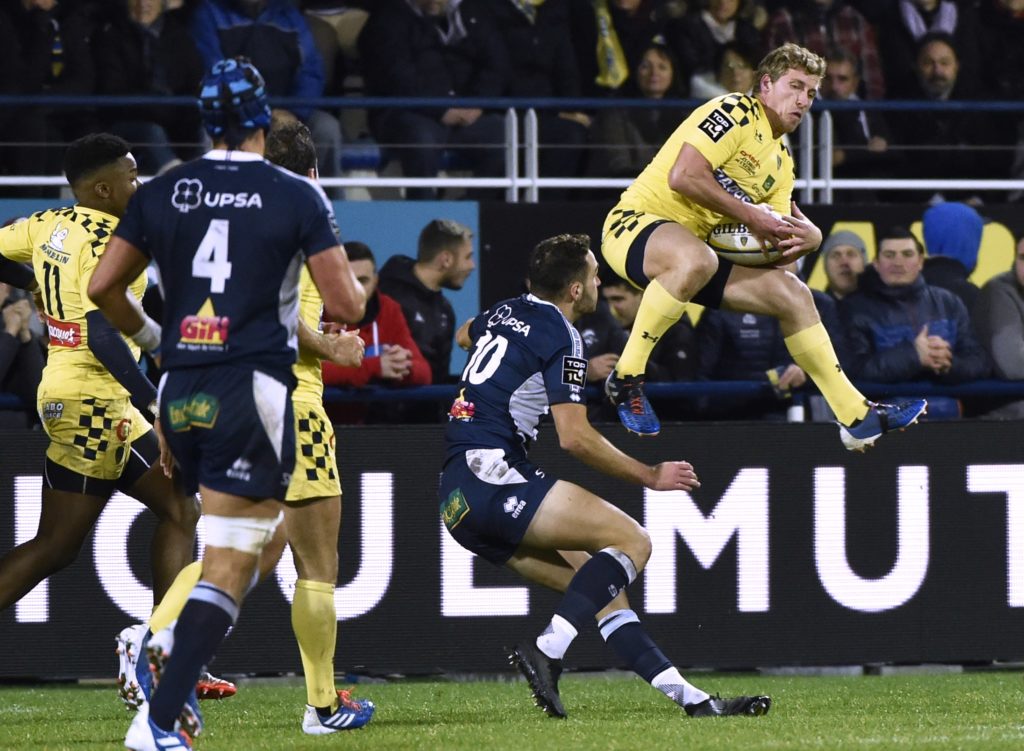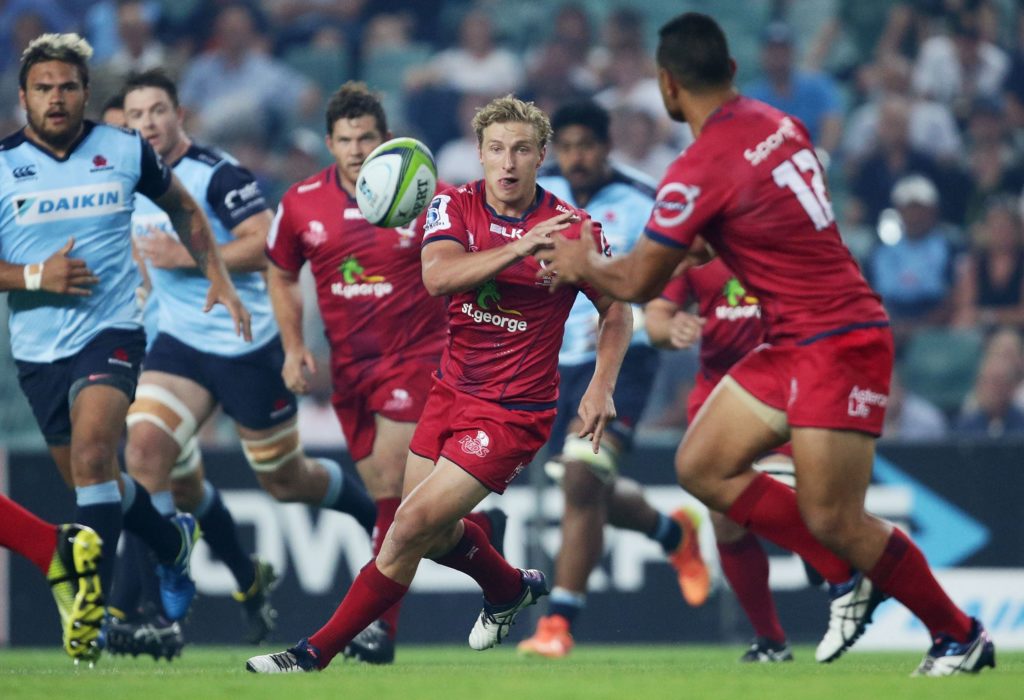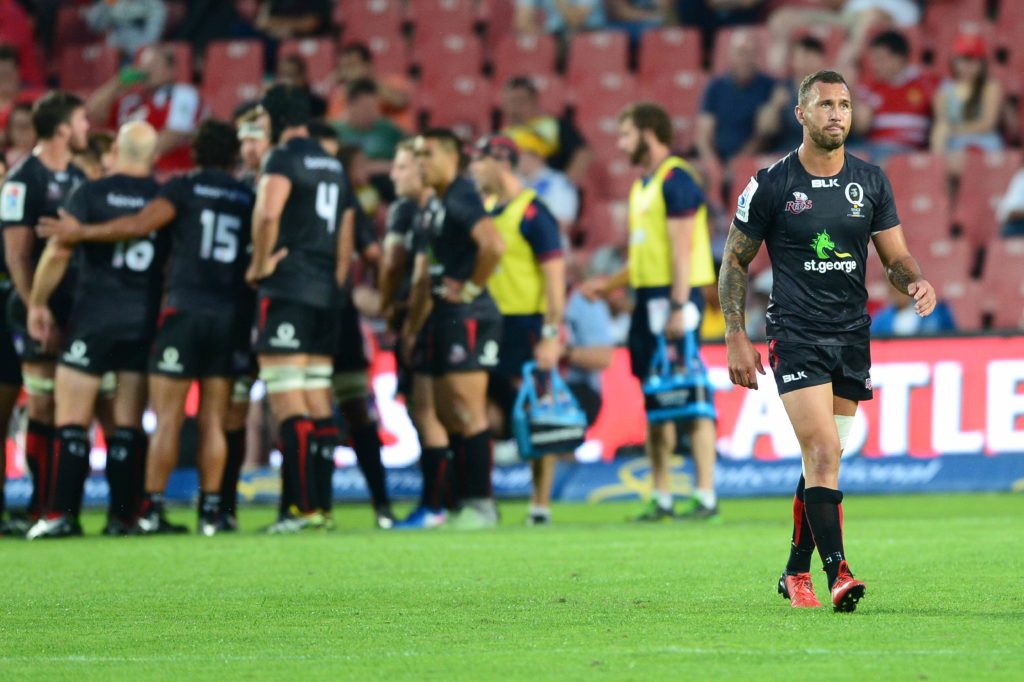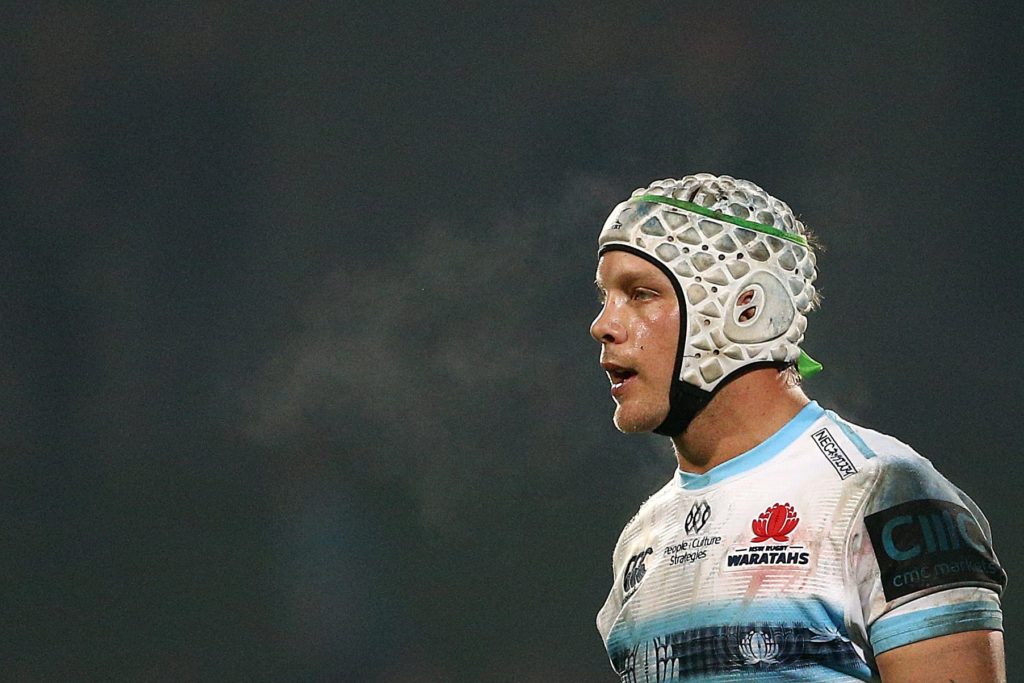Jake McIntyre was ready to give it all up.
Freshly 23, the blonde-haired kid from northern New South Wales, who was given the burdensome task of being Quade Cooper’s successor at the Queensland Reds, had had enough.
He had fallen out of love with the game; the latest prodigy to be chewed up and spat out by a flawed Australian system.
Having asked the world of him only a season earlier, the Reds wished him all the best and went in a different direction.
Forlorn, the Junior Wallabies play-maker went searching for opportunities elsewhere in Australia in the middle of 2017. None were forthcoming.
A mere 24 hours before the French Top 14 deadline, the phone pinged and an offer from Agen – a club started before Australia was federalised – was tabled.
But if not for some choice words from his girlfriend, McIntyre might well have swapped codes and given rugby league a go or done away with sport for good and instead concentrated on his business degree.
“If it wasn’t for her, I probably wouldn’t have gone,” McIntyre tells The XV. “She turned around and said, ‘I think you need to take it.’
“She said, ‘You need to leave, you don’t enjoy rugby, what’s the worst that can happen? You can go to France and hate rugby there too, but you’ll still get to travel a fair bit.’”
Less than a fortnight after touching down in the southwest of France, it was all systems go.
McIntyre was up against an All Blacks World Cup-winner in Aaron Cruden away at Montpellier. Agen lost, but, as he says, “The thing is, in France, the away games aren’t that important, which is quite weird.”

A week later, he helped Agen topple Dan Carter’s Racing 92 at home, knocking over 13 points from the tee.
All the while McIntyre could barely speak a word of French – a nightmare proposition for most playmakers but one that incidentally helped him find his feet.
“When I went over there, I couldn’t speak one word of French,” McIntyre says.
“I had to just play what’s in front of me, which is kind of what I did best and had got away from having to play too structured, which at the time, was the path the Reds were heading down and hindered my game a lot.
“So, I got to go back to what I did best and felt comfortable doing.”
McIntyre’s reputation built quickly during his two seasons at Agen so much so that Clermont, one of the biggest clubs in Europe with a yellow army and band to prove it, came knocking.
I left Australia with a pretty bitter taste in my mouth and not very happy, so to come back and have another crack – I think I’ve learnt a lot, so I’m just in a better space.
Jake McIntyre
“Clermont called, I got to go there for a meeting, and they’ve got unbelievable facilities and are very organised and switched on, and they were very honest with me,” McIntyre says.
“I knew [veteran French playmaker] Camille Lopez was there, but I just backed myself and I knew the way I was playing I could compete. I felt 10 games in I had done that and earned my stripes.
“It was an incredible experience and to play in the European Cup was awesome. I think that’s the closest you can play to Test match footy.”
It says something about McIntyre’s rising status that the club was shocked when he asked for a release.
“They were keen to keep me and they were a little shocked when I told them I was keen to leave,” he says.
“With COVID happening, it was kind of now or never. I had been away for almost four years and hadn’t seen my family for a long time, and I wanted to come back and play Super Rugby at some point.
“I left Australia with a pretty bitter taste in my mouth and not very happy, so to come back and have another crack – I think I’ve learnt a lot, so I’m just in a better space.”
McIntyre, who has joined the Western Force, never wanted to leave Australian rugby but was forced to after failing to impress immediately.
But was it him or the system that failed him? When Cooper went abroad following the 2015 World Cup, the Reds threw McIntyre to the hounds.
With less than a handful of games under his belt, McIntyre was tasked with leading the Reds around the park – a task made all the more difficult after Richard Graham was sacked after two games in 2016.

“It’s tough, especially when the club goes through so much change and you just happen to be there at the time,” McIntyre reflects.
“I know for me, the whole coaching structure changed, and we went to playing this structured style of rugby where the first five phases were all scripted and I could tell on a Friday’s captain’s run that boys didn’t know what they were doing. It was not their own fault, it’s not what they were good at, they weren’t structured players, and in a game you would go to call certain plays knowing that people aren’t going to get their roles right – it wasn’t ever going to be a winning recipe.
“I was 21 knowing that the game-plan wasn’t going to work because we weren’t on the same page. Looking back on it now, I’ve learnt a lot from it.”
By year’s end Nick Stiles had held off Matt O’Connor to take on the head coaching responsibilities while Cooper was returning after failing to live up to the bill at Toulon.
“It’s difficult to go from foie gras to pâté,” Toulon owner Mourad Boudjellal had colourfully described Cooper’s foray into French rugby after being recruited to fill Jonny Wilkinson’s lofty boots.
I know for me, the whole coaching structure changed, and we went to playing this structured style of rugby where the first five phases were all scripted and I could tell on a Friday’s captain’s run that boys didn’t know what they were doing. It was not their own fault, it’s not what they were good at, they weren’t structured players, and in a game you would go to call certain plays knowing that people aren’t going to get their roles right – it wasn’t ever going to be a winning recipe.
Unsurprisingly demoted to the Reds’ second choice playmaker, McIntyre got another chance almost immediately when Cooper’s tackling technique failed him, again.
“Basically, Quade got suspended and I knew I was starting the next four games, and the second game in I broke a bone in my foot, so I could barely kick a ball,” McIntyre says.
“I was like, ‘We’ll I’ve got to play because I’m off contract.’
“I knew that there was no one else and, obviously, I didn’t play my best footy in that year either, but it was my kicking foot too, so every time I kicked the ball I was in that much pain. I was devastated.
“I was pretty devastated that they said they wanted to put a lot of work into me and then all of a sudden they were like you can pack your bags.”
Making the basket case at the Reds all the more startling was Stiles’ sacking and Brad Thorn’s sudden promotion, which saw Cooper frozen out.
With no one left to turn to, including Mack Mason, another promising playmaker who had left to join the Waratahs, the Reds were back to square one.
They would turn to another fresh face from the Junior Wallabies pathway – Hamish Stewart.
Unsurprisingly, Stewart’s first two years followed a similar path.
Making it all the most disheartening, McIntyre believed he was making progress in 2017 – even if it wasn’t apparent.

“I had that year of starting and then a year on the bench, and I had a lot of niggles, and it’s the first season of Super Rugby, like, it takes a toll on your body, and I felt like I was hitting my straps and I was starting to see things in 2017,” he says.
“I felt good but my body wasn’t quite there, I was hobbling around most of the time.
“When I left, I was genuinely heartbroken. I thought I had so much to offer and I was at the start, but it just felt like everyone had given up on me, so I was genuinely heartbroken and I could have turned around and said I don’t want to play anymore.”
McIntyre’s time in France reignited his love for the game, and at the same time made him a better player.
But his story is an all too familiar one in Australian rugby in recent years, particularly for playmakers.
When Mason debuted for the Waratahs filling in for Wallabies playmaker Bernard Foley, who was sidelined with head trauma, the junior star turned heads with his eye-catching performance against the Crusaders.
When I left, I was genuinely heartbroken. I thought I had so much to offer and I was at the start, but it just felt like everyone had given up on me, so I was genuinely heartbroken and I could have turned around and said I don’t want to play anymore.
Yet over the next two seasons he could hardly buy a minute of action, with the Waratahs reluctant to bring Mason off the bench for Foley with matches in the balance and wins proving tough.
When Foley left in 2019, the Waratahs turned to Mason. Unsurprisingly, the heir apparent struggled like McIntyre did four years earlier and by season’s end he had lost his contract. Another talented youngster lost overseas.
At both franchises – the two biggest rugby states, which often reflect the state of rugby in the country – the development, or lack thereof, of the respective playmakers revealed the shortcomings of Australian rugby. Nor are those examples limited to the fly-half position.
In New Zealand, Kanye Hammington gets regular minutes at the Highlanders even though Aaron Smith is the All Blacks half-back and arguably the premier No 9 in the world.
At the Crusaders, star playmaker Richie Mo’unga only played the full 80 minutes six times in 21 matches.
Only at the Brumbies – Australia’s most successful and consistent franchise – are players regularly nurtured into top-flight rugby, with coach Dan McKellar seeing the benefit of using a full squad.
Until other Australian coaches adopt that same practice, more talented youngsters will leave. Some like Pete Samu will return, others like Michael Alaalatoa won’t.
McIntyre is excited to return.
Heartbroken at having to leave, he has unfinished business.

Would he recommend a stint to others overseas? Perhaps, but it is a gamble Australian rugby can’t afford given the already large contingent of players plying their trade overseas and the position the code finds itself not only in Australia but internationally, too, on the World Rugby rankings.
“Obviously if boys aren’t getting a go here, you need to be playing rugby,” he says.
“I’m just a fan of rugby, you don’t want people to be going overseas, but if you have to, embrace it, you play a lot of footy, which is exactly what I needed. I became a better footy player, I became a grown up.
“I think it’s different for every person. But for someone like Mack Mason, why not. He was at the Reds when I was there, didn’t get a run, he went to the Tahs and was trapped behind Foley, and when he got a chance they weren’t in a good space. So why not. He’s gone to America. He’ll get the life experience of playing overseas and he’ll likely play good minutes on the field too.
“At the end of the day, rugby’s a short career. For me, I was playing well and I wanted to come back and show people what I can do because, at the moment, I’m sure people in Australia don’t think much of me. As much as I don’t care about that, I wouldn’t mind changing their minds.”
Whether McIntyre starts in the No.10 jersey for the Force in 2021 remains to be seen.
He faces stiff competition against former Wallaby squad member Jono Lance and Argentinian recruit Domingo Miotti.
But having experienced first-hand the importance of a squad mentality in France, McIntyre says the competition for places and game-time will drive the squad forward.


Comments
Join free and tell us what you really think!
Sign up for free